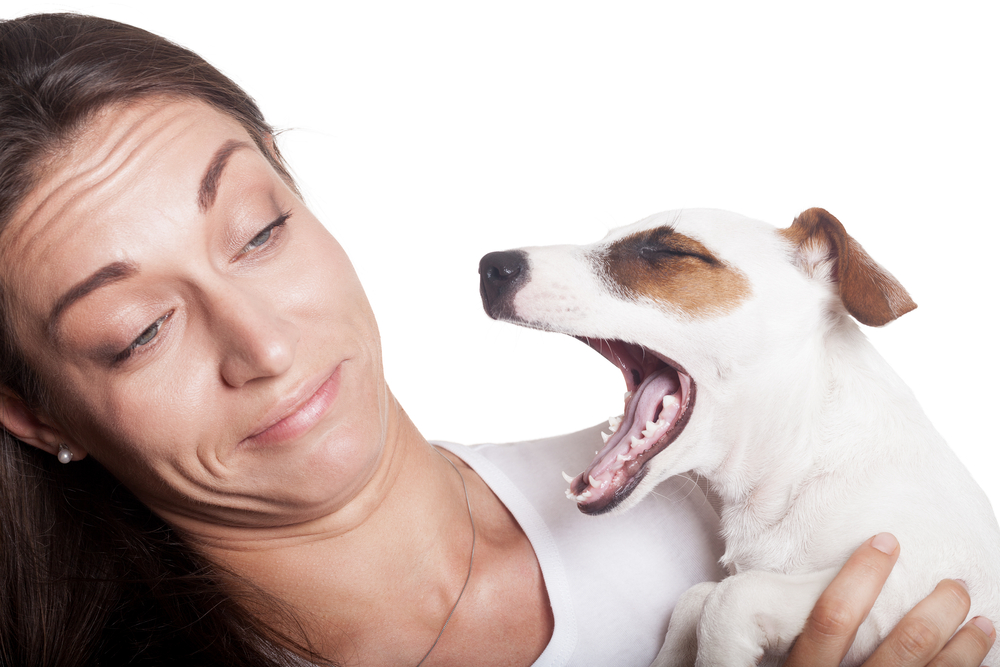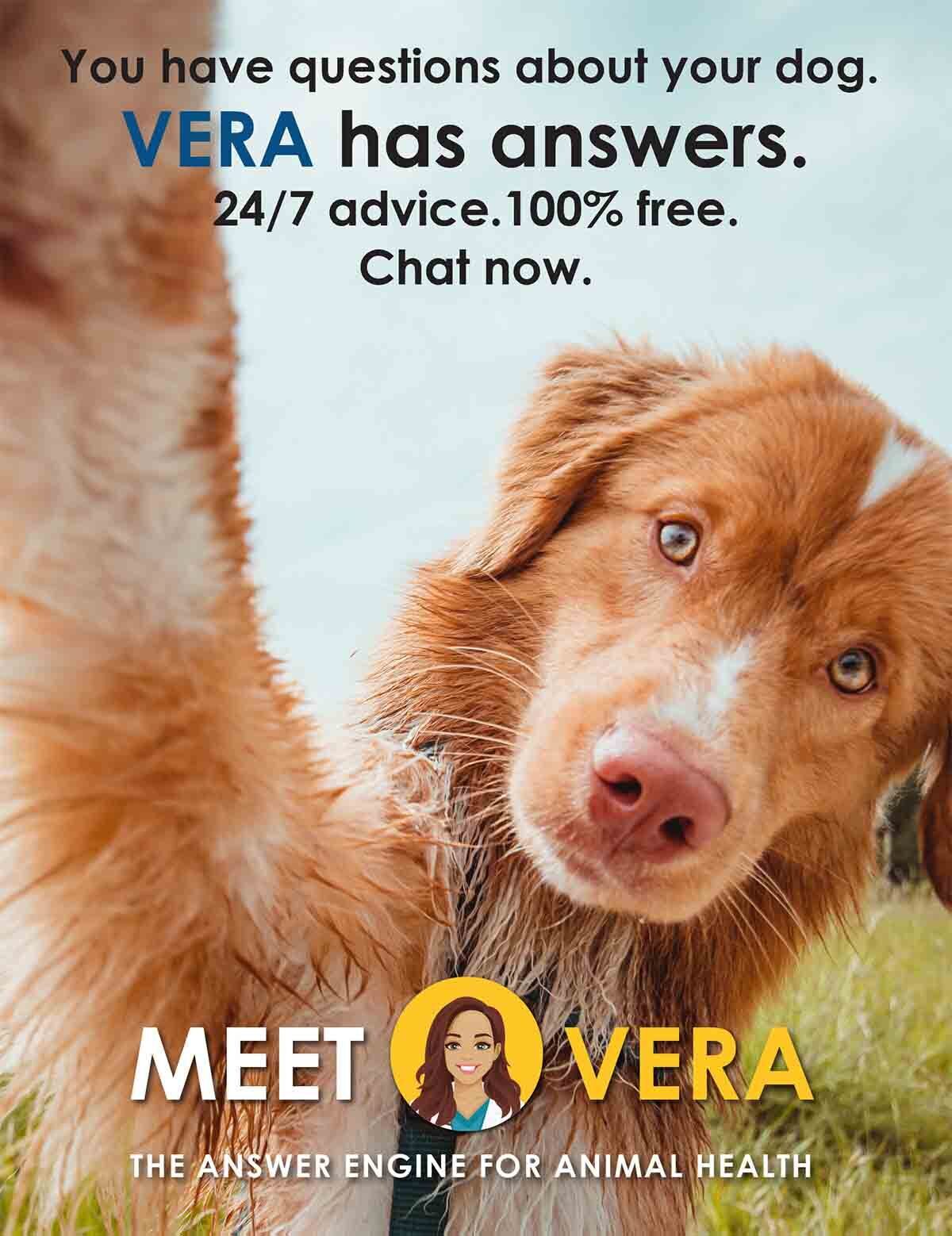Doggy breath can range from the endearing smell of “puppy breath,” to the gag-inducing odor of “trench mouth.” There are many causes of halitosis (bad breath) in dogs, and although the most common cause is usually gingivitis and dental disease, there are also a few other important ones to be aware of too. Your veterinarian is the best source to identify the origin of your dog’s bad breath, and the culprit can usually be identified after a physical exam and some blood and urine testing. Some of the causes of your pet’s stinky breath might be surprising, but all can be serious and your veterinarian can further advise on how to proceed.
The Most Common Causes of Bad Breath In Dogs
The first step in addressing your dog’s stinky breath is identifying the root cause. The following health conditions are some of the most common culprits behind bad breath in dogs.
Periodontal Disease
By far, the most common cause of stinky breath in dogs is periodontal disease or disease of the dog’s gums and tissues surrounding the teeth. Can dogs get cavities? Actually, it is rare that dogs develop cavities, but it is very common for them to develop gingivitis. In a dog’s mouth saliva, food particles, and bacteria form a biofilm called plaque that adheres to the teeth above and below the gum line causing inflammation of the tissues. Over time, the inflammation and infection cause damage and destroys the healthy gingiva, bone, and structures keeping your dog’s teeth in place. The infection spreads, bone dissolves, and the teeth will loosen and fall out. This is basically a scientific way to say that the mouth slowly rots away, yielding the foul odor that pet parents can be so familiar with. Not only is this a smelly process, but dental disease in dogs is very painful and can cause damage to other organs like the heart, kidneys, and liver.
Oral or Nasal Tumors or Infections
Less common than periodontal disease but still near the top of the list of causes of halitosis is some type of localized infection, tumor, or mass in the dog’s mouth or nasal cavity. When a veterinarian looks inside an animal’s mouth, they are not only looking at the condition of the teeth and gums, but they are also looking and feeling for any lumps, bumps, bleeding, ulcerations, or abnormal sores.
Dogs can develop a variety of tumors in their mouths; like melanoma, squamous cell carcinoma, and fibrosarcoma. When these tumors grow, the unhealthy and abnormal tissue sometimes dies and they often can become infected with bacteria, causing a foul odor.
Sometimes trauma from non-food items stuck in the roof of the mouth (like small pieces of stick!), or from chewing and biting their lips and tongue can result in an oral infection. If your dog has a skin infection involving the lips, or has a “beard” of long hair that is constantly wet or entangled with food particles, a foul odor can result as well!
Eating Something Smelly
As some of us know from firsthand experience, dogs can be quite gross sometimes. Dogs are scavengers with highly sensitive noses, programmed very differently than the human nose to seek out what we might consider unpleasant smells. They love to find random things to eat – outside, in the bushes, in the diaper bin, and in the garbage. Things that dogs put into their mouths include and are not limited to the excrement of their own production and/or other animals, and even the carcasses of dead animals.
If your dog engages in this type of consumption, this can cause (usually a more temporary) halitosis in the period of time following the incident. While eating things that we humans consider unpleasant can be commonplace for dogs, we do discourage it especially since the consumption of some of these items can result in bacterial and parasitic infections, upset stomachs, and even sometimes cause a dangerous intestinal blockage. Consult your family veterinarian for issues with coprophagia (poop eating), or if your dog is eating things routinely that are considered inappropriate (dirt, plants, etc) as this can be an indicator of diet, vitamin, and mineral imbalances.
Health Conditions
Typically, in order for health conditions and internal organ failures to cause changes in the breath smell, they are typically fairly advanced by that time and have already been diagnosed due to other symptoms. Some pet parents report being able to sense a sweet odor from their pet with uncontrolled diabetes due to the excess ketones and glucose in the bloodstream. Advanced kidney failure can be accompanied by an oral odor that resembles urine or the smell of nitrogen, and can be accompanied by ulcers in the mouth, weakness, urination issues, and vomiting. Stomach issues and diet are rarely a cause of bad breath unless persistent vomiting has caused some erosion or ulcers in the esophagus or stomach. Usually, other symptoms of these problems are noted by pet parents before the “bad breath” develops.
Consult Your Family Veterinarian
While doggie breath does not necessarily smell like roses all the time, if you are detecting an abnormal odor emanating from your dog’s oral cavity, this may be a sign of a significant medical problem. As always, it is recommended to learn how to clean your dog’s teeth at home to keep tabs on how that mouth is looking, and help prevent stinky breath from gum disease. If you notice abnormalities while brushing, or bad breath along with changes in your pup’s eating habits, blood in his water bowl or dripping from his mouth, or suspect they are losing weight – it is best that he be evaluated by your family veterinarian. A physical exam is the first step to evaluate your precious pooch for the underlying cause of these changes. Since all of the causes of bad breath benefit from early detection and intervention by your veterinarian, make sure to keep a close eye and nose on your pup!
Our AskVet Veterinarians are available to discuss all of your pet’s needs 24 hours a day, 7 days a week. Whether you have an immediate need or are looking to improve your pet’s overall wellbeing, just sign into your account and one of our friendly and knowledgeable veterinary experts will attend to your needs, no appointment required!






